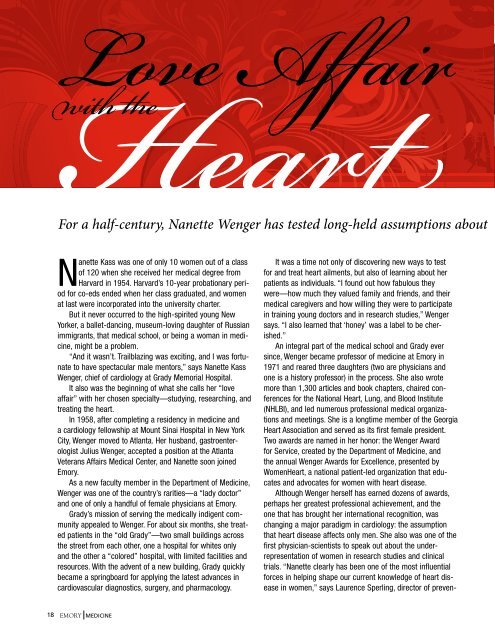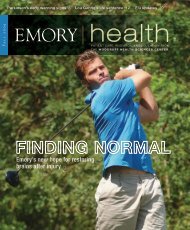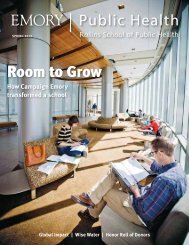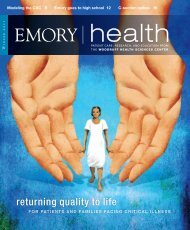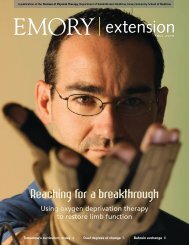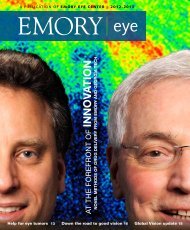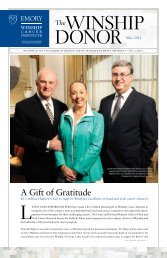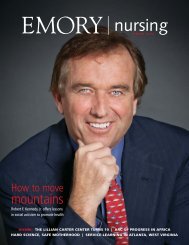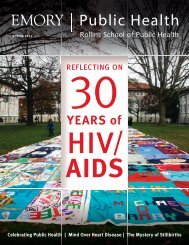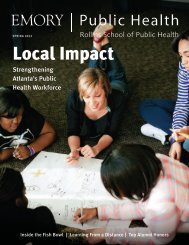medicine - Woodruff Health Sciences Center - Emory University
medicine - Woodruff Health Sciences Center - Emory University
medicine - Woodruff Health Sciences Center - Emory University
You also want an ePaper? Increase the reach of your titles
YUMPU automatically turns print PDFs into web optimized ePapers that Google loves.
Love<br />
Heart<br />
Affair<br />
with the<br />
1960s william walters (left),<br />
nanette wenger, and charles harrison<br />
help develop an emergency response<br />
for heart attacks at atlanta stadium.<br />
1977 wenger takes office as<br />
president of the georgia heart<br />
association.<br />
2006 wenger at her beloved<br />
grady memorial hospital.<br />
For a half-century, Nanette Wenger has tested long-held assumptions about cardiovascular disease among women and the elderly<br />
nanette kass was one of only 10 women out of a class<br />
of 120 when she received her medical degree from<br />
harvard in 1954. harvard’s 10-year probationary period<br />
for co-eds ended when her class graduated, and women<br />
at last were incorporated into the university charter.<br />
but it never occurred to the high-spirited young new<br />
Yorker, a ballet-dancing, museum-loving daughter of russian<br />
immigrants, that medical school, or being a woman in <strong>medicine</strong>,<br />
might be a problem.<br />
“and it wasn’t. trailblazing was exciting, and i was fortunate<br />
to have spectacular male mentors,” says nanette kass<br />
Wenger, chief of cardiology at grady Memorial hospital.<br />
it also was the beginning of what she calls her “love<br />
affair” with her chosen specialty—studying, researching, and<br />
treating the heart.<br />
in 1958, after completing a residency in <strong>medicine</strong> and<br />
a cardiology fellowship at Mount sinai hospital in new York<br />
City, Wenger moved to atlanta. her husband, gastroenterologist<br />
Julius Wenger, accepted a position at the atlanta<br />
Veterans affairs Medical <strong>Center</strong>, and nanette soon joined<br />
emory.<br />
as a new faculty member in the department of Medicine,<br />
Wenger was one of the country’s rarities—a “lady doctor”<br />
and one of only a handful of female physicians at emory.<br />
grady’s mission of serving the medically indigent community<br />
appealed to Wenger. For about six months, she treated<br />
patients in the “old grady”—two small buildings across<br />
the street from each other, one a hospital for whites only<br />
and the other a “colored” hospital, with limited facilities and<br />
resources. With the advent of a new building, grady quickly<br />
became a springboard for applying the latest advances in<br />
cardiovascular diagnostics, surgery, and pharmacology.<br />
it was a time not only of discovering new ways to test<br />
for and treat heart ailments, but also of learning about her<br />
patients as individuals. “i found out how fabulous they<br />
were—how much they valued family and friends, and their<br />
medical caregivers and how willing they were to participate<br />
in training young doctors and in research studies,” Wenger<br />
says. “i also learned that ‘honey’ was a label to be cherished.”<br />
an integral part of the medical school and grady ever<br />
since, Wenger became professor of <strong>medicine</strong> at emory in<br />
1971 and reared three daughters (two are physicians and<br />
one is a history professor) in the process. she also wrote<br />
more than 1,300 articles and book chapters, chaired conferences<br />
for the national heart, lung, and blood institute<br />
(nhlbi), and led numerous professional medical organizations<br />
and meetings. she is a longtime member of the georgia<br />
heart association and served as its first female president.<br />
two awards are named in her honor: the Wenger award<br />
for service, created by the department of Medicine, and<br />
the annual Wenger awards for excellence, presented by<br />
Womenheart, a national patient-led organization that educates<br />
and advocates for women with heart disease.<br />
although Wenger herself has earned dozens of awards,<br />
perhaps her greatest professional achievement, and the<br />
one that has brought her international recognition, was<br />
changing a major paradigm in cardiology: the assumption<br />
that heart disease affects only men. she also was one of the<br />
first physician-scientists to speak out about the under-<br />
representation of women in research studies and clinical<br />
trials. “nanette clearly has been one of the most influential<br />
forces in helping shape our current knowledge of heart disease<br />
in women,” says laurence sperling, director of preven-<br />
tive cardiology at emory.<br />
Wenger continues to study women and heart disease,<br />
and the 2005 book Women and Heart Disease, which she coedited<br />
with british cardiologist Peter Collins, is the standard<br />
medical text on the subject.<br />
“all the studies derived from registries have shown<br />
that women with heart disease still remain under-treated,”<br />
Wenger says. Consequently, she works diligently on behalf<br />
of the go red for Women campaign, sponsored by the aha<br />
and the nhlbi, to promote heart disease awareness among<br />
women.<br />
during her journey through medical school, residency and<br />
fellowship training, and her early days on the faculty, female<br />
role models and female mentors in cardiology were notably<br />
lacking. that fueled her own drive to mentor women and<br />
men at the undergraduate and postgraduate levels.<br />
Michele doughty Voeltz is among those who credit<br />
Wenger with helping create opportunities for women cardiologists<br />
and women patients with heart disease at emory.<br />
“i see a clinic made up mostly of female patients, ranging<br />
in age from their teens to their 90s,” says Voeltz. “i’m in<br />
the process of starting the emory Crawford long Women’s<br />
Cardiovascular research <strong>Center</strong>, which will incorporate comprehensive<br />
clinical care and research opportunities for our<br />
female patients.” Wenger will help raise funds and serves as<br />
primary adviser for the clinic’s evolution. “We will lead the<br />
city, and potentially the southeast, in our ability to care for<br />
women with heart disease,” Voeltz says.<br />
in the same way that Wenger challenged unproven<br />
assumptions about women’s heart disease risk, she continues<br />
to replace long-held assumptions about cardiovascular<br />
disease and care of the elderly.<br />
“We need accurate, fact-based data about this population,”<br />
says Wenger, a founder of the society for geriatric<br />
Cardiology and now editor-in-chief of the American Journal<br />
of Geriatric Cardiology. “because of our Medicare orientation,<br />
‘elderly’ has been defined as 65 and older. Where we really<br />
lack information is for octogenarians, the fastest-growing<br />
sub-population. they are poorly represented in clinical trials.”<br />
during the past year, Wenger joined forces with emory<br />
medical faculty, residents, and students to help rescue grady<br />
from the financial black hole that threatened its existence.<br />
“emory medical students and residents deserve the credit<br />
for the success of this effort,” she says. “they launched a<br />
campaign to save grady and remained committed to their<br />
patients, the need for access to care for the underprivileged,<br />
and the importance of training physicians who will practice<br />
within our state,” she says. “they became leading citizens of<br />
atlanta, and i’m so proud of them.”<br />
With a new governing board in place and a growing infusion<br />
of new funds, grady is poised to remain a top-notch<br />
teaching hospital where patients receive state-of-the-art<br />
care. “now that grady’s transition is beginning to take place,<br />
we can successfully recruit a new chief of cardiology for<br />
grady,” says Wenger. but that doesn’t mean her<br />
love affair with cardiology is ending.<br />
“My plans, at least for the short term, are to<br />
complete a number of research studies and manuscripts<br />
and continue teaching, which i cherish.”<br />
Online: To hear Nanette Wenger discuss<br />
her 50-year career in <strong>medicine</strong>, visit www.<br />
pcsw.emory.edu/audio.htm#wenger.<br />
as a new faculty member in the<br />
department of <strong>medicine</strong> in the<br />
1950s, wenger was one of the<br />
country’s rarities—a “lady doc-<br />
tor” and one of only a handful of<br />
female physicians at emory.<br />
By Sherry Baker<br />
18 EMORY MEDICINE<br />
FALL 2008 19


